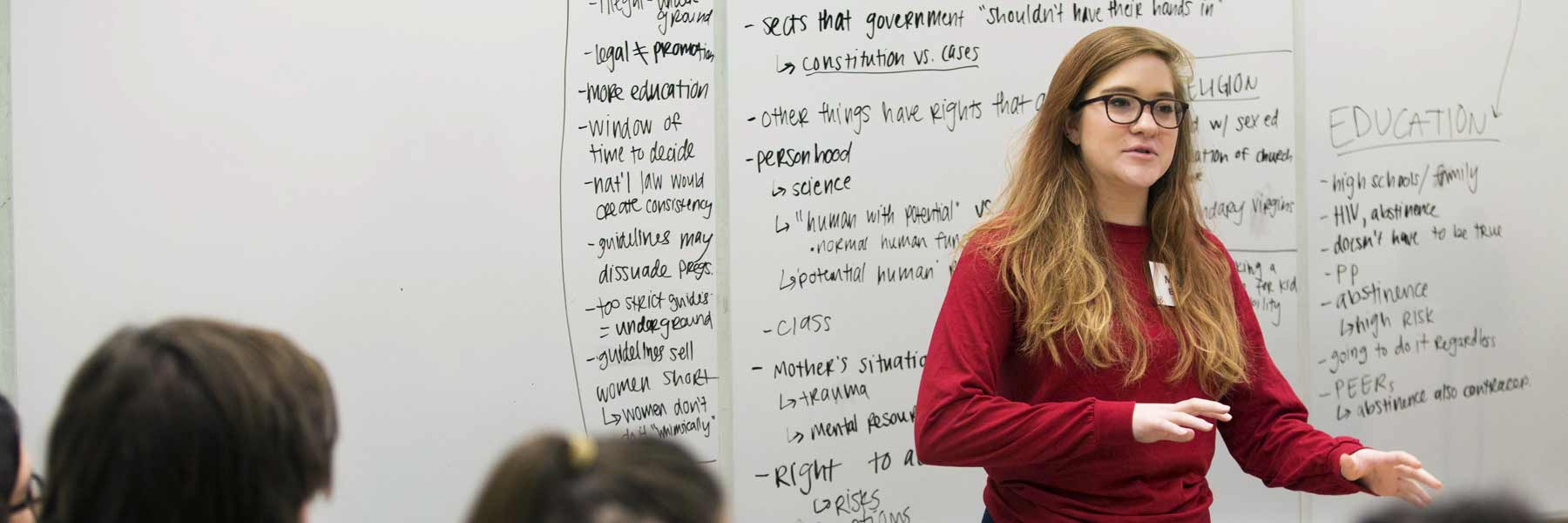The interdisciplinary courses in the PACE certificate program prepare you for a lifetime of participation in political and civic life. The skills you’ll develop—in communication, organization, decision making, critical thinking, and leadership—will serve you throughout your career and life.
Core PACE Certificate Courses
PACE-C 250 Leadership and Public Policy (3 cr.)
Health care? Immigration? Climate change? Same-sex marriage? How do decisions on these and countless other major public issues get made in America? This course provides the answers by giving students an interdisciplinary introduction to public leadership and policy making in the United States.
Students will begin by exploring important theoretical and empirical studies of leadership styles and the relationship between American politics and civil society. Then they will examine examples of public leadership and sites of public policy making from the local community to the national capital. In each section, discussion about specific individuals and issues will be used to illustrate the role of leaders and particular institutions at every level of American public life.
The course will conclude by asking students to blend their understanding of theory and practice in American public leadership and policy making by analyzing an important current issue individually and as a class. Throughout the course, students will also be introduced to the primary skills of effective engagement in political and civic discussion, deliberation, advocacy, and action.
Students who successfully complete this course should develop the following:
- A basic understanding of public leadership, public policy making, and the primary institutions of the American polity and civil society
- A basic understanding of the core concepts and working vocabulary of American public life
- The ability to use interdisciplinary research on American political and civic leadership and policy making to analyze major public issues
- The ability to find and analyze key sources of American public life such as legislation, government reports, judicial decisions, biographies, memoirs, newspaper and other media articles, and nongovernmental agencies and advocacy group websites
- The ability to work with those who hold opposing views and devise effective solutions to public problems through democratic decision making
- The ability to take informed and principled stands on major public issues and to communicate them in an effective and persuasive manner in a variety of venues
- The ability to become an effective public leader
ASCS-Q 296 College to Career II (2 cr.)
This class will allow you to explore the relationship between your chosen field of study and life after graduation. You will explore post-graduation opportunities through the lens of marketable skills. Under the guidance of career coaches and academic advisors, you will develop a portfolio that highlights skills gained through academic coursework and co-curricular experiences. By the end of the course, you will be more fully engaged in an ongoing process of academic and career planning for post-collegiate success. There are five variable topic sections of this course:
- Global & International Studies
- Media
- Arts & Humanities and Social & Historical Sciences
- Getting Into Graduate School
- Natural & Mathematical Sciences
PACE-C 200 Issue Forum (1 cr.)
The forum is held on a Saturday afternoon each spring and fall semester. An expert panel and small group deliberation are components of the structured activities. A student team directed by PACE faculty chooses the topic, facilitates the event, and moderates the small group discussions. Refreshments are served.
Requirements include a preparation pre-forum assignment, active participation in the forum, a post-forum response paper, a brief check-in meeting with the instructor, and a series of interactive online questions and responses to be completed on a weekly basis for seven weeks. The course is appropriate for any IU Bloomington undergraduate interested in practicing community decision making through democratic deliberation.
Previous topics include:
- Labor unions (Spring 2024)
- Truth, media & democracy (Fall 2023)
- Higher education (Spring 2023)
- Affirmative action (Fall 2022)
- Reparations (Spring 2022)
- Health & resilience (Fall 2021)
- Incarceration in the U.S. (Spring 2021)
- Partisan politics (Fall 2020)
- Gun violence in America (Spring 2020)
- The opioid epidemic (2019)
- The role of the media (2018)
- U.S. immigration & refugee policy (2017)
- Abortion and reproductive rights (2016)
- Policing in the U.S. (2015)
- National security (2014)
- Climate change (2013)
- Internet privacy, freedom, and security (2012)
- Immigration (2011)
- Healthcare (2010)
PACE-C 440 Forum Discussion Leader (1 cr.)
Consent of program required. This course is for PACE students who will lead discussion sessions during the Issue Forum. Students receive training in facilitation of democratic deliberation. The course includes training, practice, service at the Issue Forum, and attending a debriefing meeting. A final reflection paper is required. This course may be repeated for a maximum of 4 credit hours.
PACE-C 450 Capstone Seminar (3 cr.)
This course is designed to draw together the student’s academic study, experiential learning, and cocurricular activities. Students can demonstrate an understanding of American political and civic life and document individual learning and development.
PACE-X 473 Internship in Political and Civic Engagement (1-6 cr.)
Q 296 begins the preparation for the internship, along with PACE events such as networking nights and panels. Students will choose an experience in political and civic work and/or policy making, in a public agency, governmental branch, or nongovernmental organization. A final reflection paper, public report, and debriefing meeting are components for the credit. Consult with the PACE associate director when you are ready to plan your internship.
This course may be taken for up to 6 credits. Each credit represents at least 50 hours of internship work over at least six weeks. Three credits would be at least 150 hours over at least six weeks.


 The College of Arts
The College of Arts